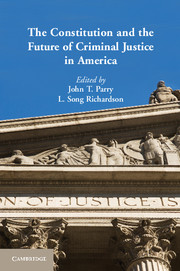Book contents
- Frontmatter
- Contents
- Contributors
- Acknowledgments
- Introduction
- Part I Foundations – The Scope of Criminal Law and Access to Counsel
- Part II Race and Criminal Procedure
- Part III Policing and Privacy
- 5 The Exclusionary Rule
- 6 Consent, Dignity, and the Failure of Scattershot Policing
- 7 Neurotechnologies at the Intersection of Criminal Procedure and Constitutional Law
- Part IV Technology and the Surveillance Society
- Part V Confessions and miranda
- Part VI Conviction, Sentencing, and Incarceration
- Part VII Emergencies and Borders – Immigration, Terrorism, National Security, and Transnational Crime
- Index
- References
6 - Consent, Dignity, and the Failure of Scattershot Policing
Published online by Cambridge University Press: 05 June 2014
- Frontmatter
- Contents
- Contributors
- Acknowledgments
- Introduction
- Part I Foundations – The Scope of Criminal Law and Access to Counsel
- Part II Race and Criminal Procedure
- Part III Policing and Privacy
- 5 The Exclusionary Rule
- 6 Consent, Dignity, and the Failure of Scattershot Policing
- 7 Neurotechnologies at the Intersection of Criminal Procedure and Constitutional Law
- Part IV Technology and the Surveillance Society
- Part V Confessions and miranda
- Part VI Conviction, Sentencing, and Incarceration
- Part VII Emergencies and Borders – Immigration, Terrorism, National Security, and Transnational Crime
- Index
- References
Summary
Introduction
Law enforcement officers often work under conditions that afford them a great deal of individual discretion about how to exercise their power to police. In this chapter, I explore how Fourth Amendment doctrine, as formulated by the U.S. Supreme Court, and as interpreted and applied by lower courts, influences law enforcement policy and individual officers’ exercise of this discretion. It does so not only by articulating specific rules for conduct, but by expressing opinions and values about the power relationships between law enforcement officers and those they police. I argue that the Court’s Fourth Amendment jurisprudence has encouraged the aggressive targeting of large numbers of people for stops and searches, the vast majority of whom are innocent of any crime. Many of these searches are premised on the highly questionable notion that the individuals targeted have freely consented to a search of their persons, vehicles, or belongings. The result is a set of law enforcement practices that maximize unpleasant and frightening encounters between civilians and police; the vast majority of these encounters uncover no crime, yet collectively they are gradually cultivating a popular attitude of fear and resentment, rather than a willingness to cooperate with legal authorities. In order to repair what is now an atmosphere of bitterness and distrust toward the police in some communities, law enforcement agencies and officers should follow the lead of the handful of state supreme courts that have limited the ability to conduct consent searches on a scattershot and arbitrary basis. I conclude that rather than leveraging their broad discretion into a fishing expedition for criminal activity based on little or no reasonable suspicion, law enforcement agencies should leverage the cooperation of ordinary people who share their aim to reduce crime and build safer communities.
- Type
- Chapter
- Information
- Publisher: Cambridge University PressPrint publication year: 2013



